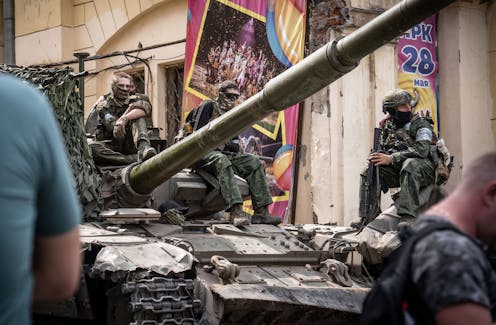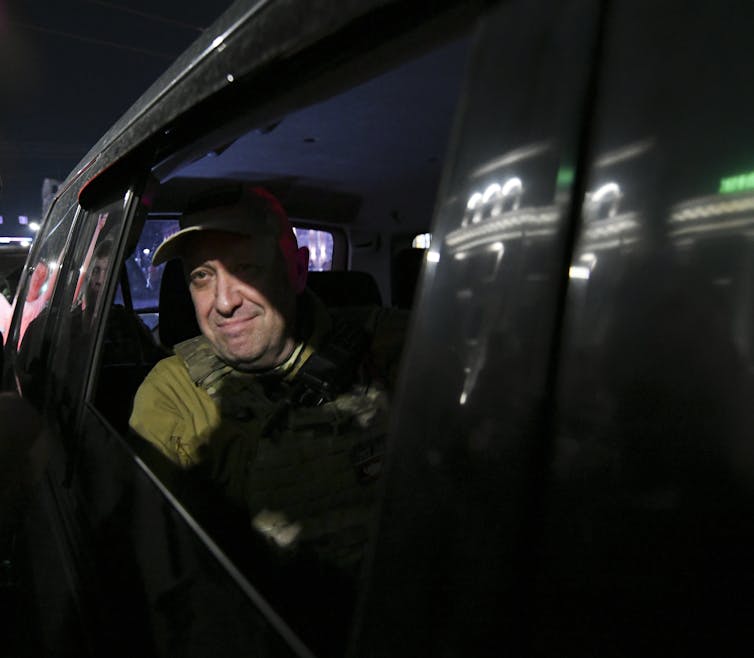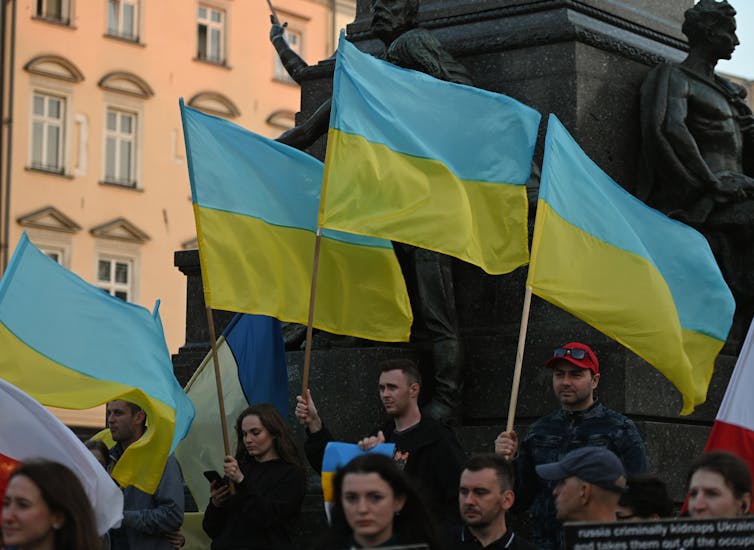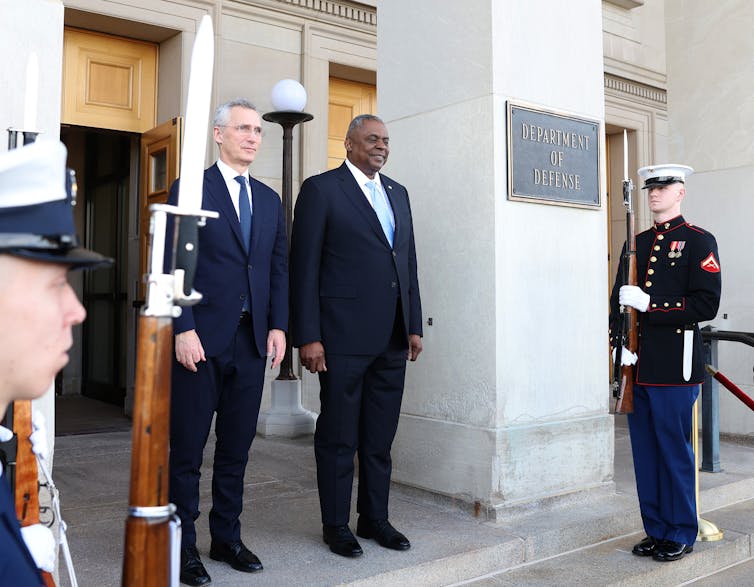
On June 23, 2023, 16 months into Russia’s war with Ukraine, Yevgeny Prigozhin, leader of Russia’s now disbanded potent mercenary fighting force and a protégé of Russian President Vladimir, turned his troops on the Russian military and, ostensibly, the Kremlin itself.
Within 24 hours, though, Prigozhin had aborted his march to Moscow and turned his troops around. But the damage to Putin’s strongman image and possibly his plans to subjugate Ukraine by force had been done.
From invasion to mutiny
The war that Putin launched against Ukraine on Feb. 24, 2022, was unprovoked. NATO presented no immediate threat to Russia. Yet, Putin and his closest advisers believed that a Western-armed-and-allied Ukraine presented an existential threat to Russia’s great power ambitions. And while Ukraine was not yet in NATO, Putin felt NATO was already in Ukraine.
As most pundits and analysts in the West repeatedly state, Putin’s adventure failed in its immediate goal – to overthrow the government in Kyiv and establish some form of Russian control of this huge neighbor.
Instead, Putin achieved everything that he did not desire: a strong, unified NATO response in defense of Ukraine; a coherent, nationally conscious, fiercely anti-Russian Ukrainian response to the invasion; and the catastrophic loss of Russian men and material. Were it not for the Wagner Group, led by one-time Putin confidant Prigozhin, Russia likely would not have even achieved its major 2023 battlefield victory over the city of Bakhmut.
Now, a weekend mutiny by Prigozhin and his mercenary force has further complicated Putin’s pursuit of the war. He looks weaker, and the most competent fighting force in Russia’s aggression against Ukraine is no longer in existence to prosecute the war.

Putin – Ukraine’s unlikely unifier
Putin proved to be the greatest contributor to Ukrainian nationalism since the 19th-century Ukrainian bard Taras Shevchenko. And just as the Russian leader has, in important ways, strengthened Ukraine, he has weakened his own country. Soon after he invaded Ukraine, hundreds of thousands of Russians from different walks of life began to leave Russia.
With the mass exodus, the Kremlin had to shift from persuasion to censorship, false narratives and greater coercion and repression to keep the public from opposing the war.
The brittle, fractured nature of the Russian state was made starkly evident between June 23 and June 24, 2023, when Prigozhin, formerly the Kremlin’s caterer, mutinied and began a march on Moscow to replace the leadership of the regular Russian army.
In the weeks before the mutiny, Prigozhin had become increasingly vocal about his dissatisfaction with Russia’s military leadership and how it was running the war.
The attempted coup fizzled, though, within a day. After a fierce speech by Putin calling the mutineers traitors to the fatherland and promising harsh punishment, Prigozhin folded and agreed to go into exile in Belarus. Moscow promised not to retaliate further, and a bloody civil war was avoided.

Cracks in the Russian state
Many geopolitical pundits in the West asserted that Putin had been weakened by the mutiny. U.S. Secretary of State Antony Blinken noted the cracks in the Russian state but hesitated to predict what the future held. The U.S. government held back from commenting further, not wanting to be associated with any connection to what had transpired in Russia. But I believe it is also possible that some may see Putin as a shrewd mediator who prevented Russian-against-Russian bloodshed. He cannot be counted out.
In such a murky and fast-moving sequence of coup and collapse, I believe the U.S. government must carefully calculate its own interests and attempt to scope out what might transpire in Russia in the near future. If Putin were no longer in power, the war in Ukraine could end, though probably with the de facto retention of Crimea within Russia because it is a special case. Taken by Catherine the Great from the Ottomans and local Tatars, Crimea was part of Russia until Soviet leader Nikita Khrushchev gave it to Ukraine in 1954. Russians consider this an ancient patrimony of Russia, and any Russian government would be hard put to give the peninsula back to Ukraine.
Although seldom openly stated, U.S. goals have recently consisted of regime change in Moscow and a weaker Russia, which by its very size and geopolitical location remains a security threat to Europe and former Soviet states. Putin has managed to make Russia an international pariah, and it is difficult to imagine a secure international system that would include the current Russian regime.
US and NATO committed to Ukrainian victory
The United States and NATO are committed to a Ukrainian victory in the war and are willing to pay for it materially. Many leaders in the NATO alliance believe the sacrifices that Ukrainians have made for their independence and sovereignty will be rewarded with a major role in the security structure of the post-war European order. Whether that will mean formal membership in NATO is yet to be negotiated.
What has to be decided in the strategic calculations for a post-war settlement is how to manage Ukraine’s relationship with Russia. A return to the earlier agreed-upon Minsk II agreement – a neutral Ukraine and a federal relationship with the Donbas – seems impossible, though it would probably be acceptable to Moscow, if not to Kyiv.
If Russia is to retreat from much of its occupied territory in Ukraine, would it then be treated as the loser in the war, which the Kremlin may not accept? Would Russia be forced to pay reparations for the damage it has done to Ukraine? In my view, that would certainly be morally justified but not enforceable without a total defeat of the aggressor. And Russia’s nuclear arsenal certainly complicates any equation. There is no way to know whether a defeated, humiliated Russia would be willing to turn to nuclear weapons as a last resort.

From mutiny there may be resolution
From my perspective, there is a utopian solution, sensible if difficult to achieve.
With Russia weakened by the Prigozhin mutiny, Putin may be willing to rethink continuation of the war. An immediate cease-fire could be declared as a first step toward negotiations and a compromise that could end the war.
From Ukraine’s perspective, a possible compromise might include removal of all Russian forces from Ukraine, with the exception of Crimea; reparations by Russia for damage done to the country; and a commitment from the West to help rebuild Ukraine.
Russia may want international guarantees that Ukraine will not join NATO, but would be free to become a member of the European Union, and the beginning of talks focusing on a new international security structure. That structure would bring Russia, China and India, as well as other countries, into some form of cooperative system guaranteeing the sovereignty and territorial integrity of all states.
Ronald Suny does not work for, consult, own shares in or receive funding from any company or organization that would benefit from this article, and has disclosed no relevant affiliations beyond their academic appointment.
This article was originally published on The Conversation. Read the original article.







